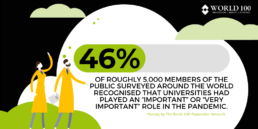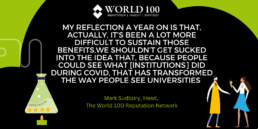In October 2022, Head of The World 100 Reputation Network, Mark Sudbury contributed to an article for Times Higher Education. The piece explored whether universities were able to achieve a reputational gain during the COVID-19 pandemic, primarily through related research. This topic was also the focus of The World 100 Reputation Network’s research in 2020/2021, giving Mark a unique perspective within the discussion.
You can view the original article via TImes Higher Education’s website. We have reproduced it below, with full credit to the author Pola Lem:
Months into the pandemic, academics were thrust into the public eye like never before. Some of them became household names, while others forged new relationships with government and industry, securing multimillion-dollar grants to develop vaccines and reliable coronavirus tests.
At the time, many in academia predicted that Covid-19 would be a game-changer for university relations with the public, governments and the private sector. But two and a half years later, have their hopes been met? And how can institutions keep leveraging positive sentiment to achieve long-lasting visibility, grow collaborations and attract research funding?
University leaders and communications experts speaking with Times Higher Education agree that positive predictions made early in the pandemic have largely been borne out.
“A rising tide lifts all boats,” agrees Tania Rhodes-Taylor, chief executive and founder of the education consultancy Otus Advisory.
“Universities are very complex organisations…a lot of what they do is difficult to make relevant to the population as a whole or urgent to government, and suddenly we had this situation that what universities do was relevant to everyone,” she says.
Rhodes-Taylor credits institutions’ proactiveness and agility with “adding to their capital”, particularly as “that’s not something people expected”.
Data lend credence to the argument. A November 2021 study by the World 100 higher education consultancy found that 46 per cent of roughly 5,000 members of the public surveyed around the world recognised that universities had played an “important” or “very important” role in the pandemic. Meanwhile, nearly all the communications directors surveyed believed that their university had managed to leverage their reputational boost from pandemic-related research.
While universities focused on getting accurate science to the general public, many also made important gains in building relationships with government and industry.
Fiona Fox, chief executive of the UK-based Science Media Centre, a non-profit organisation that promotes the use of informed science in the press, noticed a distinct change in industry engagement at its events.
“Until the pandemic, it was almost impossible to get scientists from companies on our panels,” says Fox. “We ran 200 press briefings during the pandemic…and we would say, ‘can we have the director of research from a company’, and they would say ‘yes’. We haven’t had that ‘yes’ before.”

At Imperial College London, which claims to lead the UK sector in industry engagement, the pandemic has enabled new pharmaceutical and medical technology spin-outs and has “given us a profile whereby even our major partners are considering increasing their activity with us”, says the institution’s provost, Ian Walmsley.
Still, the extent of gains vis-à-vis partnerships with industry vary widely by institution – and companies’ views of academia appear to be unchanged. Mark Sudbury, head of World 100 (which is owned by THE), says a survey that it conducted did not show “any significant change or uplift in the perception businesses have of universities”, which may relate to the fact that most companies are moved less by institutional image than they are by interactions with academics on specific collaborations.
But has the pandemic created tangible gains for universities in the form of government relationships or grants?
Walter Ricciardi, Italy’s top Covid-19 expert and a professor of hygiene and public health at Università Cattolica del Sacro Cuore, Rome, tells THE that the development of closer relationships with policymakers “still much relies on specific academics that are consulting for the government”.
But he does note financial gains, with Italian universities benefiting from the European Union’s Recovery and Resilience Facility, worth more than €723 billion (£608 billion).
“In Italy, an important part of this money has been allocated to research and in particular to academic research – so there’s concrete benefit deriving from money,” Ricciardi says.
The University of Oxford, arguably the UK’s most visible institution thanks to its work developing a Covid-19 vaccine, has established an interdisciplinary Pandemic Sciences Institute by raising private funds and securing a financial commitment from the UK government. Dame Louise Richardson, Oxford’s vice-chancellor, says the institute will allow the university to pull in humanities research on questions including how to address vaccine hesitancy.
“It’s going to enable us to retain the various wonderful scientists we have doing research on pandemics, and also serve as a magnet for other scientists from around the world,” she says.
But despite the already palpable benefits for institutions, analysts cautioned against complacency.
According to Sudbury, 12 months after conducting the research for the World 100 study measuring universities’ reputation boost, institutions’ reputation gains may be tapering off as society exits the “acute phase” of the pandemic.
“My reflection a year on is that, actually, it’s been a lot more difficult to sustain those benefits,” he says, noting that other emerging crises – such as the war in Ukraine – have not allowed universities and academic experts to shine in the same way as they did during the pandemic.
“We shouldn’t get sucked into the idea that, because people could see what [institutions] did during Covid, that has transformed the way people see universities,” he cautions.
So far, it appears that university heads are keeping their eye on the ball.

Ron Daniels, president of Johns Hopkins University, says that universities’ work on Covid made a “demonstrable impact” and that “people took notice”. But, he is quick to add, “we cannot rest on our laurels”.
Walmsley, who is chair of experimental physics as well as provost at Imperial, agrees.
“It is certainly incumbent upon us to be clear in our own statements and narratives on how we helped to benefit society,” including the “less direct” benefits tied to universities’ mission of educating students, he says.
Yet despite some leaders’ clear appreciation of the value of research communications, at many universities, persuading administrators that they must invest in the area continues to be an uphill battle.
“It feels like sometimes science press officers have to fight to convince people that what they’re doing is contributing to reputation – rather than being a self-indulgent thing on the side,” says the Science Media Centre’s Fox.
She attributes some institutions’ struggles to capitalise on reputation gains to understaffed communications departments and leadership “preoccupied” with a host of other issues: “a dramatic rise in number of students, tax on universities from governments, fees, overseas students”.
“Universities were pulled away from the awareness-raising – that’s really the lesson,” she says.
Otus Advisory’s Rhodes-Taylor also argues for a more methodical approach.
“Universities have to be seen as at the centre of the solution, not at the periphery – they can’t retreat, they need to stay there; but you need people who can maintain that engagement. You can’t expect academics to do their day job as currently defined and also engage.”
She cautions against the temptation for communications to “boil the ocean”, ensuring that every single person connects a research finding with an institution. Instead, communicators should focus on reaching specific target audiences, and do so in a scientific way.
“Outreach needs to be thought about, invested in, curated, measured. Just doing it isn’t enough,” she says.
World 100’s Sudbury, too, stresses the need for universities to “get cleverer” about content curation. Beyond simply aggregating press clippings, teams should be thinking about tailored products that they can create, such as subject-specific podcasts or weekly newsletters geared at target audiences, he says.
Equally, universities need to do more to support their scholars to engage with the public, including protecting high-profile academics who have raised university profiles at the cost of attracting online abuse, analysts say.
In coming years, as older lecturers leave the workforce and are replaced by younger researchers more comfortable discussing their work online, there will likely be more direct engagement between scholars and the public. If universities want their message to resonate, part of the key may be relinquishing some control, allowing academics to take initiative and not seeking to tidy up individual researchers’ messages too much, says Sudbury.
“The age of everything being driven by university press release is gone,” he says. “I think communications teams have to be realistic – you can’t control all of that, and it doesn’t make sense to control it.”


